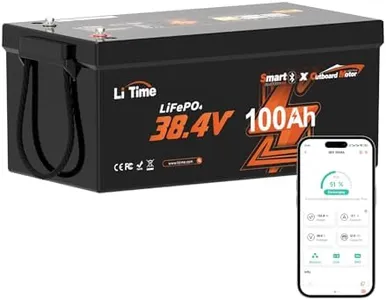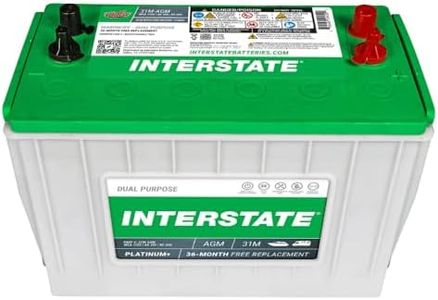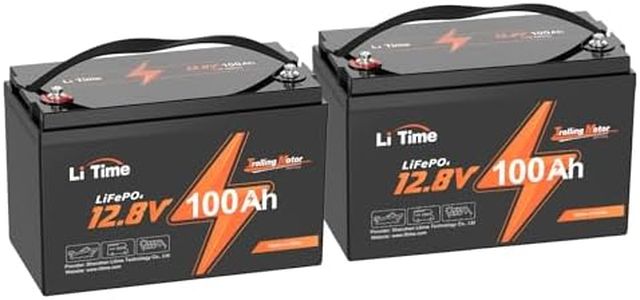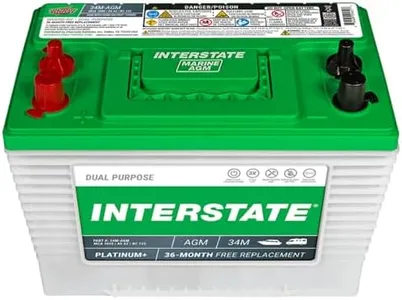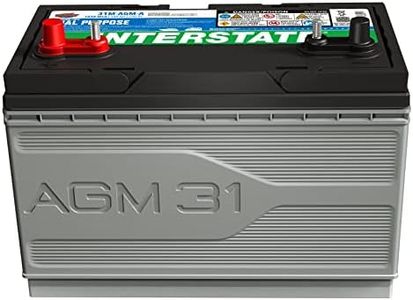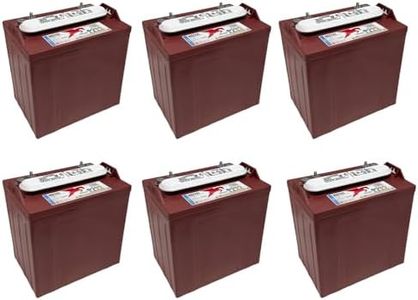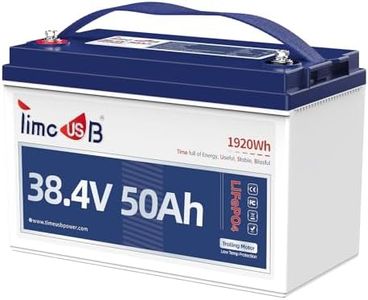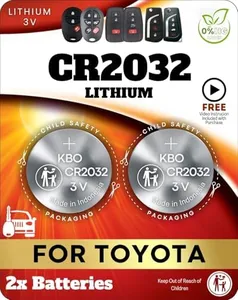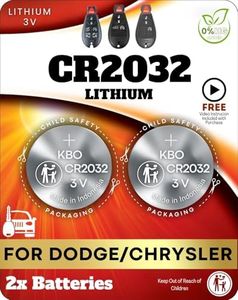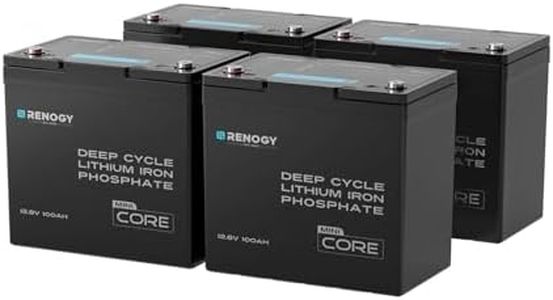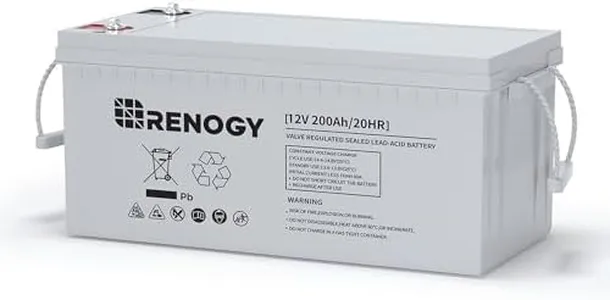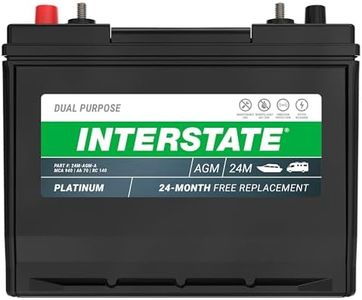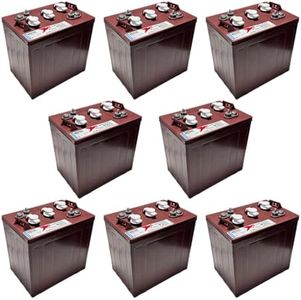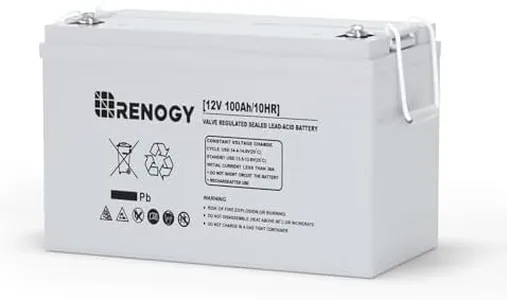10 Best Marine Deep Cycle Batteries 2026 in the United States
Our technology thoroughly searches through the online shopping world, reviewing hundreds of sites. We then process and analyze this information, updating in real-time to bring you the latest top-rated products. This way, you always get the best and most current options available.

Our Top Picks
Winner
Interstate Batteries Marine/RV Battery 12V 100Ah 925CCA (31M-AGM) Dual Purpose Power Pure Lead AGM RV & Marine Starting Replacement Battery (Group Size 31M) Boats, RV's
The Interstate Batteries 12V 100Ah AGM battery is designed as a dual-purpose marine and RV battery, meaning it can start your boat’s motor and also provide steady power for accessories like lights and pumps. Its pure lead AGM design offers a longer lifespan—about two to three times longer than typical batteries—thanks to advanced technology and thick plates that support deep cycling without wearing out quickly. You get 100 amp-hours capacity, which is solid for medium to larger boats or RV setups requiring reliable, extended power.
At 72 pounds and Group 31M size, it’s fairly compact but heavy, which is typical for deep cycle marine batteries. Being AGM (Absorbed Glass Mat), it’s maintenance-free, sealed, and resistant to spills, making it safer and easier to handle than traditional flooded batteries. It also performs well in rough marine conditions and can recharge faster, so you spend less time waiting and more time on the water.
The battery’s 925 cold cranking amps indicates good starting power, but for very large engines or extreme cold environments, you might want to check if it meets your specific needs. While it tolerates typical marine temperatures well, it’s not suited for extreme freezing conditions without additional insulation. The price point may be higher than flooded batteries, reflecting its advanced design and longer life. This battery is a great fit for boaters and RV owners who want dependable starting power combined with strong deep-cycle performance, all with minimal upkeep. Its rugged build and long service life make it well worth considering if you value reliability and convenience in a marine battery.
LiTime 12V 100Ah Trolling Motor LiFePO4 Battery (Group 31), 12 Volt Lithium Battery with Low Temp Protection, Up to 15000 Deep Cycles, Built-in 100A BMS for Marine, Boat, RVs & Yacht (2-Pack)
Most important from
481 reviews
The Litime 12V 100Ah LiFePO4 battery is designed with marine applications in mind, making it particularly suitable for trolling motors, boats, and RVs. One of its standout features is the battery management system (BMS) that offers triple protection against common issues like overcharging and short circuits, ensuring safe operation even in harsh conditions. With a remarkable cycle life of up to 15,000 cycles at 60% depth of discharge, this battery outperforms traditional lead-acid batteries, which typically last only a few years. Its low-temperature cut-off feature is a great addition for those using it in cooler environments, ensuring reliable performance year-round.
The battery’s lightweight design (22.1 pounds) and compact size make it easy to handle and install, an important factor for marine applications where space and weight are critical. The auto sleep mode is another practical feature, significantly reducing self-discharge when the battery is not in use, which can prolong its overall lifespan.
There are a few considerations to keep in mind. The initial cost of lithium batteries tends to be higher than traditional batteries, which can be a hurdle for some users. Also, while the battery is designed for various applications, its performance is optimized for trolling motors, so users with different needs should ensure it meets their specific requirements. Furthermore, while the warranty period of 5 years is solid, potential buyers might want to consider the brand's customer service responsiveness, although it is generally reported to be good.
Most important from
481 reviews
Interstate Batteries Marine/RV Battery 12V 62Ah 800CCA (34M-AGM) Dual Purpose Power Pure Lead AGM RV & Marine Starting Replacement Battery (Group Size 34M) Boats, RV's
Most important from
82 reviews
The Interstate Batteries 12V 62Ah Marine/RV battery is designed as a dual-purpose option, combining starting power with deep cycle capacity, which is ideal if you want one battery that can start your boat or RV motor and also power devices like trolling motors, lights, or pumps. It uses advanced pure lead AGM technology, offering a longer service life—up to 2 to 3 times that of conventional AGM or flooded batteries—and faster recharge times, which means fewer replacements and less downtime. With 62Ah capacity and 800 cold cranking amps (CCA), it provides solid starting power and sustained energy for extended use, covering both reserve capacity and cycle life needs effectively.
The battery is built tough to withstand harsh marine and RV conditions and features maintenance-free sealed construction, so you don’t have to worry about adding water or leaks. It weighs around 47.6 pounds and measures roughly 11 x 7 x 8 inches, which is fairly standard and manageable for most setups. While it excels in moderate temperature tolerance, extreme cold or heat might still impact performance as with most batteries in this category.
This battery suits boaters and RV owners seeking reliability and versatility in a single unit without the hassle of maintaining traditional flooded batteries. If you need extremely high reserve capacity or specialized deep-cycle use only, there might be other batteries more tailored to those specific demands.
